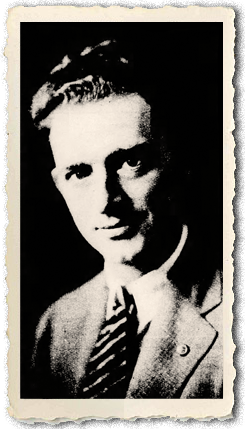Painton’s Letters Home from WWI | 23 October 1918
THIS month we’re featuring  Frederick C. Painton’s letters he wrote home while serving with the American Expeditionary Forces in WWI. Portions of these letters were published in his hometown paper, The Elmira Star-Gazette of Elmira, New York. Before the war young Fred Painton had been doing various jobs at the Elmira Advertiser as well as being a part-time chauffeur. He was eager to get into the scrap, but was continually turned down because of a slight heart affliction and was not accepted in the draft without an argument. He was so eager to go that he prevailed upon the draft board to permit him to report ahead of his time. Painton left Elmira in December 1917 with the third contingent of the county draft for Camp Dix but was again rejected. He was eventually transferred to the aviation camp at Kelly Field as a chauffeur, and in a few weeks’ time was on his way to England in the transport service with an aviation section, where he landed at the end of January 1918 as part of the 229th Aero Supply Squadron. He was transferred to the 655 Aero Squadron in France shortly thereafter.
Frederick C. Painton’s letters he wrote home while serving with the American Expeditionary Forces in WWI. Portions of these letters were published in his hometown paper, The Elmira Star-Gazette of Elmira, New York. Before the war young Fred Painton had been doing various jobs at the Elmira Advertiser as well as being a part-time chauffeur. He was eager to get into the scrap, but was continually turned down because of a slight heart affliction and was not accepted in the draft without an argument. He was so eager to go that he prevailed upon the draft board to permit him to report ahead of his time. Painton left Elmira in December 1917 with the third contingent of the county draft for Camp Dix but was again rejected. He was eventually transferred to the aviation camp at Kelly Field as a chauffeur, and in a few weeks’ time was on his way to England in the transport service with an aviation section, where he landed at the end of January 1918 as part of the 229th Aero Supply Squadron. He was transferred to the 655 Aero Squadron in France shortly thereafter.
FRED PAINTON WRITES HOME OF HIS FIRST AIRPLANE TRIP
Elmira Star-Gazette, Elmira, New York • 23 October 1918
Former Elmira Newspaper Man, Now Serving in France, Gives Detailed Descriptions of Sensations Experienced in First Air Voyage.
Sergeant Fred Painton, former Elmira newspaper man. now attached to the 496th Aero Squadron, with the American Expeditionary Forces in France, in his latest letter describes his “most wonderful experience,” a trip in an airplane. His account of the journey through the air makes the reading almost as thrilling as the ride itself.
Sergeant Painton recently enjoyed a furlough in Paris, an experience to which he had long looked forward to, and, next to Elmira, he declares it the most beautiful city in the world. It was shortly after his trip to Paris that he was given the opportunity to ride in an airplane.
His letter follows:
“496 Aero Squad. Amexforces. France.
“Oct. 1, 1918.
“Dear Friend:—
“Well I shall have to tell you the many experiences that have happened to me since I wrote from Paris.
“To begin with I have made my initial trip in an airplane and that to me is the most wonderful thing that could happen to anyone. The day after I wrote you from Paris, I took some high officials of the air service to a aviation camp. After the business, which called them there was transacted they decided to take a “joyhop.” Forthwith we proceeded to the flying field, where they made ready for the trip.
“I waited my chance and then when one of the aforementioned high officials came close to me, I heaved a deep sigh and remarked to the empty atmosphere that I would give my right arm, if only I could get a chance to take a trip in a “ship.” The said H.O. turned to me and asked if I had ever been up, and upon my answering ‘no’, he yelled to one of the pilots, and told him that it would be all right for him to take me up in the next two seater he flew. The ‘airgnat’ said that he was going to fly one of the two sealers right away and motioned for me to follow him. I did and you can believe that I was all afluter. To think that I was going up there, where all the rest of those white winged planes were lazily running in circles. It seemed almost to good to be true.
“As they had no helmets to spare, I simply took off my overseas cap and left on my goggles. The pilot told me that it would give me a good shampoo. They are glad to take anyone up at this field, when they have occasion to fly a two-seater, as it does away with the necessity of putting in a two hundred pound sack of sand. I very gingerly climbed into the rear cockpit and waited for them to crank the motor. This is done very carefully as the slightest mistake means the life of the mechanic, who is cranking. The pilot calls out “coupe.” The mechanic repeats it after him so that there can be no mistake. That means that the switch is off and then the propeller is turned over to draw a charge of gas into the cylinders. Then the mechanic yells “contact,” and again the pilot repeats after him. Then with one foot braced that he may jump away from the terrific suction caused by the churning of the propeller, the mechanic gives a quick twist and with a roar the powerful motor starts. The noise was deafening and the wind from the propellor seemed more than likely to tear the hair from my head. Eventually the pilot nodded his head and then by means of long ropes, the blocks were withdrawn from in front of the landing wheels and we “taxied” across the field for the start.
“I have no distinct remembrance of the exact moment, when we left the earth, but suddenly saw the tops of the hangars and the trees drop away beneath me. Then I knew that I was actually for the first time in my life off of terra firma, with nothing but a bit of canvas and wood between me and—what? There were no straps, as the observer usually stands up. All I had to rest on was a little folding seat on the side and a couple of grips. We were then about 600 feet up. and climbing all the time in wide spirals. The sensation is something that I shall always remember. The view itself was wonderful, of course, but it reminded me of the time when I first saw a moving picture taken from an airplane. But then came the realization that it was I, really I, in this machine, and that there was the earth below me, falling away gradually as we continued to climb. At 800 feet the buildings, trees and hills stood out somewhat, and made the scene unequalled for grandeur, but when the little dial on the dash registered 1,200 feet, things became flat, and the earth resembled a multi-colored checker board. The wind was terrific. I had to keep my neck and head craned forward to overcome the terrific pressure.
“The roar of the motor was deafening, but after a few moments I paid no attention to it; my mind being taken up with the different emotions that assailed me. I had no sense of fear, this machine being a large roomy craft, with a wireless key, clocks and other intricate machines for telling the aviator where he was and how high. No more did I have that qualmy feeling in the “basement” that so many fellows tell about, who have taken their first ride. This, however, may be explained by the fact that it was about five-thirty when we went up and at this time there are no “air pockets,” or diverging stratas of air that cause the ‘plane to sway. When we would bank around the ‘plane would roll gently like a ship in a heavy sea, although the former rolls more quickly. After twelve minutes had elapsed the roar of the motor ceased and we “peeked over” for the long volplane to the field. The wind whistling through the wire braces sounded like a thousand ghosts trying to shriek at once. The earth still resembled a flat, many colored checkerboard, but when we had dropped to about seven or eight hundred feet, the hangars, buildings and trees began to assume depth. This is a very strange phenomenon and is truly wonderful to watch. It seemed to me as we rapidly neared the earth that we would not clear the hangars, but suddenly they passed beneath me and the next thing I felt was a slight bump. We bounced into the air, but the pilot turned on the motor in order to keep her nose up and we came down again with another bump, this time to stay. I had been in the air just fourteen minutes, that is counting the time that we started “taxiing.” The experience is one that will ever be green in my memory and although it is just possible that I may get a chance to go up again, the sensations experienced will never be the same as they were on this, my initial trip.
“I was going to tell you about Paris, too, so will do my best. Aside from Eimira, N.Y., it is the most beautiful city in the world, at least I think so, and so do all the rest. The bridges across the Seine are beautiful examples of architectures and the goldened domed invalides when viewed from the Place de la Concorde, is magnificent beyond description. Unfortunately the Arch de Triumph has been divested of most of its wonderful sculptoring for fear of destruction in raids but even what is left is very wonderful.
“Paris in war time is the most cosmopolitan city that one could ever see. Uniforms of all nations are to be seen on its boulevards at all times. There are representatives of all the relief societies, that I ever heard of and some that I or anyone else never heard of. There are associations for the relief of all the ailments that mankind is heir too and a few that we are not. Bizarre and gaudy uniforms are worn by these people. I really believe that thev have got a “society for the rehabiliation of asphyxiated cooties” and an association for the education of shell shocked trench rats. No disease misses their eagle glance
“If the night life of Parts is called quiet
now, I certainly would have liked it here 
before the war. The life centers mostly
 around the “Folies Bergere” and the 
Casino des Paris. I really enjoyed myself
 six days there very much. As It Is time 
for “taps” I must close. Your friend.

FRED.
- Download clipping (23 October 1918, Elmira Star-Gazette)
- Download full page (23 October 1918, Elmira Star-Gazette)




